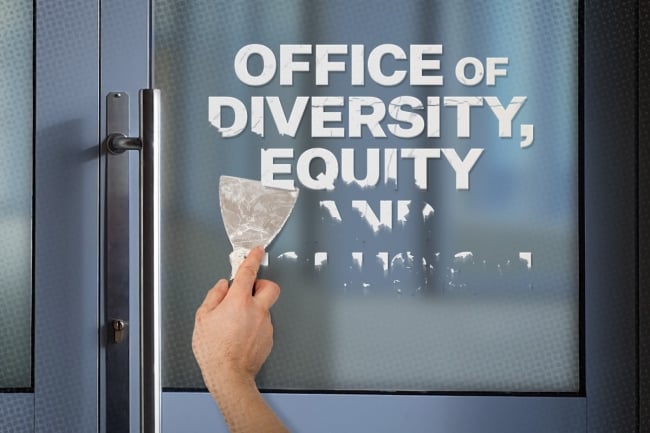You have /5 articles left.
Sign up for a free account or log in.

Colleges from South Carolina to Utah have scrapped the phrase “diversity, equity and inclusion” from names of offices and divisions.
Photo illustration by Justin Morrison/Inside Higher Ed | sssss1gmel and Alexandr Baranov/iStock/Getty Images
Not long after Texas passed SB 17, a law prohibiting diversity, equity and inclusion programs at public colleges and universities, many institutions chose to rename their former DEI offices, using words like “belonging,” “community engagement” and “student development” in the new titles.
But last month, an anti-DEI legislator warned that cosmetic adjustments were not enough. Republican state senator Brandon Creighton, the lead sponsor of SB 17, wrote letters to Texas’s public university systems reminding them that compliance with the law goes beyond renaming offices.
“While I am encouraged with the progress I have seen from many institutions of higher education in implementing SB 17, I am deeply concerned with the possibility that many institutions may choose to merely rename their offices or employee titles,” he wrote. ”This letter should serve as notice that this practice is unacceptable.”
Last week the University of Texas at Austin announced it was closing its Division of Campus and Community Engagement—formerly its DEI division—and laying off 60 employees, according to the Austin American-Statesman.
UT Austin president Jay Hartzell said the change would cut down on programs that were duplicated amid the restructuring to comply with SB 17. But many in the UT Austin community and beyond chastised the institution for appearing to cow to anti-DEI politics beyond what was mandated by state law.
An editorial in the Austin American-Statesman slammed the state—“driven by Republican fervor to hunt down and crush what they’ve deemed ‘woke’ tendencies in education”—for “gnawing deeply into the reputation of its magnificent higher education system.”
Austin wasn’t the only UT campus to flip-flop. Last December the University of Texas at San Antonio announced it would close its DEI office and open an Office of Campus and Community Belonging instead. But on Jan. 2—the day after SB 17 went into effect—PresidentTaylor Eighmy backtracked, announcing that the new office would not open after all.
“Given our evolving understanding of SB 17 as well as continuing voluntary changes in staffing and personnel reappointments from that office, it no longer made sense to launch the new office,” Eighmy wrote in a statement to the campus community. “Instead, we will leverage the strong capabilities of our existing offices and divisions to realign ADA and disability services, campus climate and community engagement activities across various institutional divisions.”
He added that the “integrated approach” was more efficient for serving the campus.
DEI programs and practices have now been outlawed in some form or another in 10 states, with critics arguing that they demean and sideline white, cisgender, heterosexual students for characteristics they have no control over. Proponents of DEI, meanwhile, believe that such programs are essential for supporting students who have been historically marginalized, discriminated against or excluded from higher education.
Amid the debates, the phrase “diversity, equity and inclusion” itself has become just as fraught as the actual work it signifies. In December, just before SB 17 went into effect, one anonymous Texas employee told Inside Higher Ed that they have scrapped the phrase from their vocabulary entirely while at work.
“Those three words in particular are very triggering,” she said.
Despite pushback in Texas to what legislators perceive as purely aesthetic changes to DEI offices, institutions in other red states around the country are rushing to alter DEI language—even in states like South Carolina, that do not yet have legislation in place restricting DEI. Officials at many institutions argue the name changes are not in response to political pressure and are instead satisfying some part of their mission or strategy. But it remains to be seen how such adjustments will be received by DEI’s critics—especially lawmakers.
Motivated by ‘University Values’
In South Carolina, where the legislature has introduced but not yet passed any DEI bans, at least two public universities have nevertheless chosen to change the names of their DEI offices. The University of South Carolina changed its Office of Diversity, Equity and Inclusion to the Division of Access, Civil Rights and Community Engagement last summer; in December, Clemson University similarly renamed its former DEI office the Division of Community Engagement.
In an emailed statement to Inside Higher Ed, a spokesperson for Clemson said the name change is designed to “drive the concepts of community, engagement, belonging and access across the University in alignment with Clemson’s new strategic plan, Clemson Elevate, and to align with the University’s values.”
Likewise, University of South Carolina spokesperson Collyn Taylor described the change as a “reorganization,” stressing that the new division now houses the institution’s civil rights and Title IX offices, as well as various programs dedicated to community engagement and improving access “for all current and future students regardless of backgrounds.”
No programs, initiatives or roles have been eliminated in the reshuffling, Taylor wrote in an email.
When asked if the change was at all impacted by politics, he replied that “[South Carolina’s] policies will remain consistent with federal and state law.”
At least one state has outlawed the language itself in the titles of higher education offices and divisions. Utah recently passed HB 261, a DEI ban that some have praised as more balanced than other state laws because it allows race-based cultural centers to stay open and preserves former DEI offices' funding, as long as they alter their operations in compliance with the law. However, it also prohibits those offices from being “referred to or named diversity, equity, and inclusion.”
As a result, Utah Valley University has already changed the name of its Office of Inclusion and Diversity to the Office of Institutional Engagement and Effectiveness; the rest of the state’s eight public institutions will have to do so by July 1, when the law goes into effect, the Salt Lake Tribune reported.
In an emailed statement, Scott Trotter, a Utah Valley spokesperson, told Inside Higher Ed that the change was made in conjunction with the new law but also aims to “strengthen the university’s core values of exceptional care, exceptional accountability and exceptional results.”
Rasha Qudisat, the former Chief Inclusion and Diversity Officer, will lead the new office as the Chief Engagement and Effectiveness Officer.
‘Shifting Target’
Geoffrey Landward, the newly appointed commissioner of higher education in Utah, said his office is interpreting HB 261 to mean that division titles can’t incorporate the entire phrase “diversity, equity, and inclusion,” which he believes has taken on a life of its own, but can still use the words individually.
“That phrase, I think, has taken on a meaning itself that, in some viewpoints, suggests a certain type of political ideology. I think that’s what our legislators are concerned about. Like critical race theory, whether people understood what that was and what it wasn’t, that phrase itself became politicized and I think the same thing has happened with DEI,” he said, adding that universities will have to make more than just cosmetic changes to implement the bill.
Landward is hopeful that the absence of that polarizing label will, in fact, make it easier for universities to do the work of providing increased access and opportunity to students who need it.
Not everyone agrees. Angela Romero, the minority leader in the Utah House of Representatives and the president of the National Hispanic Caucus of State Legislators, believes that getting rid of those familiar words will instead make it difficult for students to know where to go to receive those services.
It could also send the message that diverse experiences aren’t welcome or appreciated on campus, she said. She recalled attending the University of Utah and utilizing what was then called the Center for Ethnic Student Affairs (which was renamed the Center for Equity and Student Belonging in 2021).
“I knew, as a student of color on a predominantly white campus, that I could go there when I felt like someone had said something somewhat racist in a classroom or a professor had treated me a certain way,” she said. “I knew I could meet students who had similar experiences. I knew there would be a counselor there for me. So, for me, I see this as erasure.”
Peter Lake, a professor of law at Stetson University in Florida and the director of the university’s Center for Excellence in Higher Education Law and Policy, said he long anticipated backlash to universities choosing to make primarily surface-level changes to their DEI offices. As many colleges shift to using words like “belonging” and “engagement,” he said, there is a chance that those words, too, will become suspect in the eyes of Republican lawmakers.
“It’s a shifting target,” he said. “Legal compliance here isn't as simple as putting a new license plate on a car.”
In fact, he argued, dismantling the departments entirely and shifting their duties into separate offices—as the University of Arkansas did last summer—may be the best way to avoid politicians’ scrutiny.
“Maybe the answer is to break everything into pieces and stick it here, there and everywhere in a way that makes it difficult to identify it as some sort of ideological project. Whether there’s even a department should be on the table,” Lake said.




